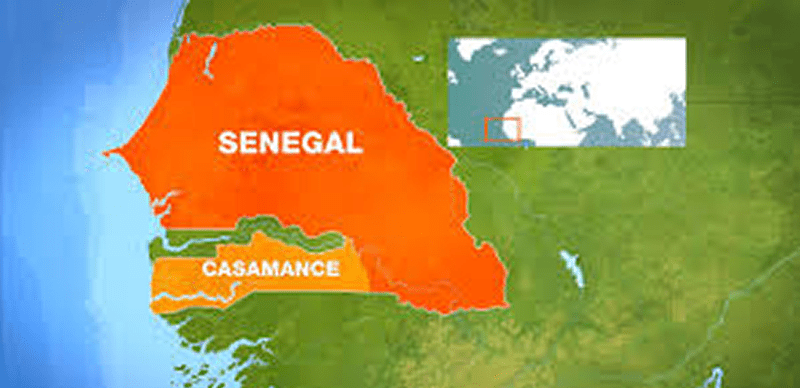Senegal has begun tallying votes in the presidential election held on Sunday. The two main rivals expressed confidence in their chances of winning the election, following years of unrest and a political crisis.
The winner will be responsible for guiding Senegal, known as a symbol of democracy in coup-hit West Africa, through recent difficulties and handling revenues from oil and gas reserves that are about to start production.
Among the 17 candidates, two frontrunners have emerged, including a female candidate: the governing coalition’s former prime minister Amadou Ba and anti-establishment candidate Bassirou Diomaye Faye.
Both were once tax inspectors, but Ba, 62, now represents continuity, while 43-year-old Faye promises significant change and left-wing pan-Africanism.
Both candidates have also positioned themselves as the best choice for young people in a country where half the population is under 20.
Diaraaf Gaye, a 26-year-old shopkeeper, stated, “I voted for Diomaye without thinking. It’s time for the country to start anew with young people in power.
However, 23-year-old housekeeper Ndeye Penda Faye expressed her support for the government’s candidate, stating, “(President) Macky Sall has accomplished a lot, and that’s why I'm going to vote for Amadou Ba, to continue the work.”
Voting officially ended at 1800 GMT, with the count commencing immediately afterward, as observed by AFP journalists at two polling stations in the capital Dakar.
Provisional results may be available overnight, although the first official results are anticipated during the week.
Given the number of candidates and the requirement for an absolute majority, a second-round vote is probable, but no date has been set yet.
Senegal was originally scheduled to vote on February 25, but a last-minute delay by Sall led to the worst political crisis in decades, resulting in four deaths.
Calm queues formed outside polling stations, with many voters waking up early to pray before heading straight to polling stations.
Voting materials, including ballot boxes, still bore the original February poll date.
“We finally got there. May God be praised. Recent times haven’t been easy for Senegal, which has experienced several upheavals,” said Mita Diop, a 51-year-old trader.
“But all that is behind us now,” she added, emerging from a Dakar polling station with her finger stained in red ink to show she had cast her ballot.
Opposition figurehead Ousmane Sonko, who was barred from standing due to a defamation conviction, stated that young people had turned out to vote in large numbers.
“We are convinced that at the end of this day, the victory will be dazzling,” Sonko stated, referring to his deputy and endorsed candidate, Faye, as he voted in his southern stronghold of Ziguinchor.
“I remain confident about the choice for the change that I can embody better than any other candidate,” Faye said alongside his two wives, adding he was “convinced” of a first-round victory.
But Faye’s rival Ba is also optimistic about his chances.
“There is no doubt that at the end of today, we should know the next president of the republic,” he said after voting in Dakar, adding he was “very, very, very confident”.
– Peaceful, effective –
Sall, who is not seeking re-election after serving two terms, cautioned candidates against prematurely claiming victory in the election.
“It is not the responsibility of a candidate or a political group to declare victory or results,” Sall stated after casting his vote with his wife in the central western town of Fatick.
Many observers from civil society, the African Union, the ECOWAS regional group and the European Union are present.
The leader of the EU mission, Malin Bjork, commented that voting had occurred “peacefully, effectively and in a very organized manner”.
After a period of uncertainty, Senegal’s highest constitutional body overturned Sall’s effort to postpone the vote until December and compelled him to reschedule the date to March 24, resulting in a rushed campaign that clashed with the Muslim fasting month of Ramadan.
Ba, Sall’s chosen potential successor, has presented himself as a final defense against “bandits” and encouraged people to vote “based on experience and competence rather than entrusting the country to adventurers”.
On Sunday, he discussed a plan to strengthen and speed up “everything that has been done so far”.
However, Sall’s legacy also encompasses widespread arrests, ongoing poverty, 20-percent unemployment and thousands of migrants embarking on the dangerous journey to Europe each year.
Several incidents of unrest, partly sparked by a standoff between the outspoken Sonko and the government, have resulted in dozens killed and hundreds detained since 2021.
A swiftly approved amnesty law led to the release of Faye and the charismatic Sonko from prison on March 14. Sonko had finished third in the 2019 presidential election.
Senegal started tallying votes in Sunday’s presidential election as the two main competitors expressed confidence in winning an election that followed several years of turmoil and a political crisis. The victor will be responsible for guiding Senegal, seen as a model of democracy in coup-plagued West Africa, out of its recent difficulties and […]
Several episodes of unrest triggered partly by a stand-off between firebrand Sonko and the state have seen dozens killed and hundreds arrested since 2021.
A rapidly passed amnesty law led to the March 14 release from prison of Faye and the charismatic Sonko, who came third in the 2019 presidential poll.
AFP



